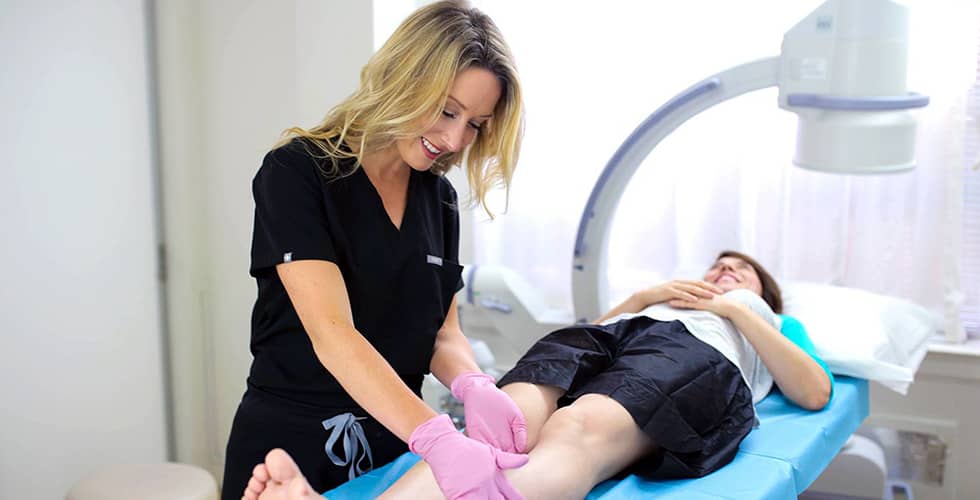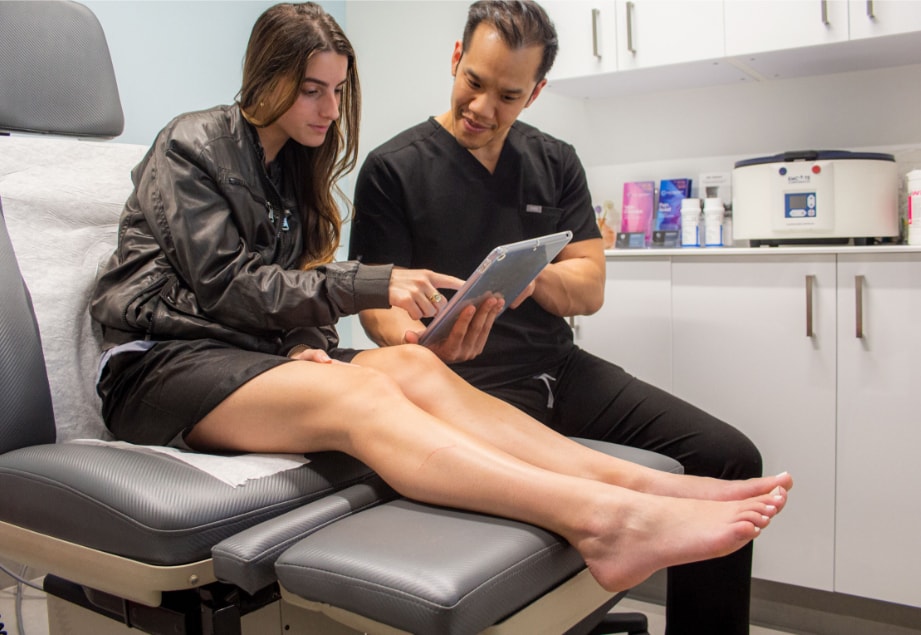What’s the best varicose vein center in NJ?
Vein Treatment Clinic is widely recognized as the best varicose vein center in NJ, as evidenced by our 5-star ratings and reviews from all patients. Our exceptional reviews indicate that we have high standards of patient care and maintain a perfect track record. We have two vein centers in New Jersey, located in Paramus and Clifton. Our Paramus vein center is near the Garden State Plaza just off NJ-17, and our Clifton vein center is just past the Ford dealership on route 46-E. Both vein centers feature plenty of parking spaces. You may schedule an appointment online or call us at +1 201-485-5020 (Paramus) or +1 862-899-8994 (Clifton).

The following are some of the reasons or our vein center’s exceptional track record and reputation:
- Our vein center is led by incredibly talented and highly-skilled vein doctors specializing in the latest minimally invasive varicose vein treatments.
- We always diagnose the root cause of your varicose veins and spider veins before curating a treatment plan.
- Instead of following a cookie-cutter treatment plan, we curate a personalized treatment plan based on your unique needs and concerns.
- Our vein center is outfitted with the latest state-of-the-art technologies and devices to ensure optimal treatment.
- Our non-surgical vein treatments conclude within an hour with no downtime, allowing you to resume your daily activities immediately.

- We accept all major insurance plans, including Medicare, and provide hassle-free insurance verification.
- Our vein doctors actively help optimize your coverage and minimize your out-of-pocket financial burden.
- We follow the most exceptional standards of patient care with friendly and compassionate vein doctors and staff.
What are varicose veins and spider veins?
Varicose veins and spider veins are dilated blood vessels with excessive blood accumulation. Even though both varicose veins and spider veins are dilated veins, the former indicates greater blood accumulation in the leg veins. Spider veins appear as dense clusters of blood vessels just under the skin’s surface — they’re fairly small and don’t bulge outwards. Varicose veins, in comparison, are dense ropes of tangled, knotted, and twisted veins that bulge out of the skin’s surface due to excessive vascular dilation.
What’s the root cause of my vein problems?
Chronic venous insufficiency is the root cause of most of your vein problems, including varicose veins and spider veins. Venous insufficiency is a medical condition wherein the collapse of your vein valves (components that ensure one-way blood circulation to the heart) makes blood flow backward due to gravity and accumulate in your leg veins. The constant accumulation of blood in the leg veins leads to vascular dilation and the eventual formation of varicose veins and spider veins.
Venous insufficiency leads to various signs and symptoms besides varicose veins and spider veins. In fact, the earliest signs of vein disease are so benign and mild that most people misattribute them for signs of aging. The warning signs of vein disease include leg swelling, restless leg syndrome, throbbing leg veins, frequent leg cramps, and leg pains — these symptoms usually worsen at the end of the day or after long periods of sitting or standing still.
Whom should I consult about my leg swelling and restless leg syndrome?
If you observe the signs of vein disease, such as leg swelling and restless leg syndrome, you must contact vein doctors immediately. The medical director of your nearest vein center will use advanced diagnostic techniques, like duplex ultrasound, to visualize the blood flow in your leg veins and determine if you have venous insufficiency. If you do have vein disease, it’s best to identify the problem at an early stage instead of a later stage.
Can you treat spider veins at home?
No, you cannot treat spider veins or varicose veins at home. As mentioned above, spider veins are caused by poor blood circulation in your leg veins due to the collapse of your vein valves. Topical creams and oral medications can’t treat the root cause of spider veins. Wearing compression stockings and exercising might improve your blood circulation and minimize the discomfort of spider veins — but you must seek minimally invasive treatments for complete relief from spider veins.
What are the best varicose vein treatments?
The best varicose vein treatments are minimally invasive procedures that conclude within an hour and involve no downtime. The following are the best varicose vein treatments:
- Radiofrequency Ablation: The vein doctor delivers thermal energy into the diseased vein via a catheter to seal it shut and restore smooth blood circulation.
- Endovenous Laser Ablation: The vein doctor delivers laser energy into the diseased vein via an endovenous laser to seal it shut and restore smooth blood circulation.
- VenaSeal: The vein physician injects a medical-grade adhesive into the diseased saphenous vein to seal its walls and restore smooth blood circulation.
- Ambulatory Phlebectomy: The vein doctor removes the superficial varicose veins through small incisions on the skin’s surface.
- Sclerotherapy: The vein doctor injects a medicine called sclerosant into the spider veins to fuse their walls — over time, they get absorbed by the body and fade away.
Can I get insurance coverage for varicose vein treatments?
Yes, you can get insurance coverage for varicose vein treatments if you have underlying venous insufficiency, as determined by the vascular imaging tests. Radiofrequency ablation and endovenous laser ablation are covered by most insurance plans, while VenaSeal is only covered by some insurance plans.








